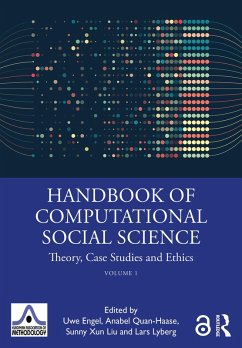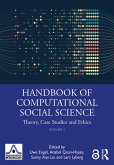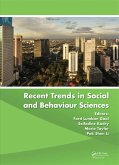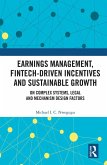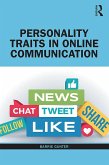Handbook of Computational Social Science, Volume 1 (eBook, ePUB)
Theory, Case Studies and Ethics
Redaktion: Engel, Uwe; E Lyberg, Lars; Liu, Sunny; Quan-Haase, Anabel
57,95 €
57,95 €
inkl. MwSt.
Sofort per Download lieferbar

29 °P sammeln
57,95 €
Als Download kaufen

57,95 €
inkl. MwSt.
Sofort per Download lieferbar

29 °P sammeln
Jetzt verschenken
Alle Infos zum eBook verschenken
57,95 €
inkl. MwSt.
Sofort per Download lieferbar
Alle Infos zum eBook verschenken

29 °P sammeln
Handbook of Computational Social Science, Volume 1 (eBook, ePUB)
Theory, Case Studies and Ethics
Redaktion: Engel, Uwe; E Lyberg, Lars; Liu, Sunny; Quan-Haase, Anabel
- Format: ePub
- Merkliste
- Auf die Merkliste
- Bewerten Bewerten
- Teilen
- Produkt teilen
- Produkterinnerung
- Produkterinnerung

Bitte loggen Sie sich zunächst in Ihr Kundenkonto ein oder registrieren Sie sich bei
bücher.de, um das eBook-Abo tolino select nutzen zu können.
Hier können Sie sich einloggen
Hier können Sie sich einloggen
Sie sind bereits eingeloggt. Klicken Sie auf 2. tolino select Abo, um fortzufahren.

Bitte loggen Sie sich zunächst in Ihr Kundenkonto ein oder registrieren Sie sich bei bücher.de, um das eBook-Abo tolino select nutzen zu können.
The Handbook of Computational Social Science is a comprehensive reference source for scholars across multiple disciplines. It outlines key debates in the field, showcasing novel statistical modeling and machine learning methods, and draws from specific case studies to demonstrate the opportunities and challenges in CSS approaches.
- Geräte: eReader
- ohne Kopierschutz
- eBook Hilfe
- Größe: 4.2MB
Andere Kunden interessierten sich auch für
![Handbook of Computational Social Science, Volume 1 (eBook, PDF) Handbook of Computational Social Science, Volume 1 (eBook, PDF)]() Handbook of Computational Social Science, Volume 1 (eBook, PDF)57,95 €
Handbook of Computational Social Science, Volume 1 (eBook, PDF)57,95 €![The Naked Android (eBook, ePUB) The Naked Android (eBook, ePUB)]() Julie CarpenterThe Naked Android (eBook, ePUB)46,95 €
Julie CarpenterThe Naked Android (eBook, ePUB)46,95 €![Recent Trends in Social and Behaviour Sciences (eBook, ePUB) Recent Trends in Social and Behaviour Sciences (eBook, ePUB)]() Recent Trends in Social and Behaviour Sciences (eBook, ePUB)196,95 €
Recent Trends in Social and Behaviour Sciences (eBook, ePUB)196,95 €![Routledge Handbook of Genomics, Health and Society (eBook, ePUB) Routledge Handbook of Genomics, Health and Society (eBook, ePUB)]() Routledge Handbook of Genomics, Health and Society (eBook, ePUB)47,95 €
Routledge Handbook of Genomics, Health and Society (eBook, ePUB)47,95 €![The Oxford Handbook of Cyberpsychology (eBook, ePUB) The Oxford Handbook of Cyberpsychology (eBook, ePUB)]() The Oxford Handbook of Cyberpsychology (eBook, ePUB)39,95 €
The Oxford Handbook of Cyberpsychology (eBook, ePUB)39,95 €![Earnings Management, Fintech-Driven Incentives and Sustainable Growth (eBook, ePUB) Earnings Management, Fintech-Driven Incentives and Sustainable Growth (eBook, ePUB)]() Michael I. C. NwoguguEarnings Management, Fintech-Driven Incentives and Sustainable Growth (eBook, ePUB)43,95 €
Michael I. C. NwoguguEarnings Management, Fintech-Driven Incentives and Sustainable Growth (eBook, ePUB)43,95 €![Personality Traits in Online Communication (eBook, ePUB) Personality Traits in Online Communication (eBook, ePUB)]() Barrie GunterPersonality Traits in Online Communication (eBook, ePUB)44,95 €
Barrie GunterPersonality Traits in Online Communication (eBook, ePUB)44,95 €-
-
-
The Handbook of Computational Social Science is a comprehensive reference source for scholars across multiple disciplines. It outlines key debates in the field, showcasing novel statistical modeling and machine learning methods, and draws from specific case studies to demonstrate the opportunities and challenges in CSS approaches.
Hinweis: Dieser Artikel kann nur an eine deutsche Lieferadresse ausgeliefert werden.
Dieser Download kann aus rechtlichen Gründen nur mit Rechnungsadresse in A, B, BG, CY, CZ, D, DK, EW, E, FIN, F, GR, HR, H, IRL, I, LT, L, LR, M, NL, PL, P, R, S, SLO, SK ausgeliefert werden.
Hinweis: Dieser Artikel kann nur an eine deutsche Lieferadresse ausgeliefert werden.
Produktdetails
- Produktdetails
- Verlag: Taylor & Francis eBooks
- Seitenzahl: 416
- Erscheinungstermin: 10. November 2021
- Englisch
- ISBN-13: 9781000448610
- Artikelnr.: 62905871
- Verlag: Taylor & Francis eBooks
- Seitenzahl: 416
- Erscheinungstermin: 10. November 2021
- Englisch
- ISBN-13: 9781000448610
- Artikelnr.: 62905871
- Herstellerkennzeichnung Die Herstellerinformationen sind derzeit nicht verfügbar.
Uwe Engel is Professor at the University of Bremen, Germany, where he held a chair in sociology from 2000 to 2020. From 2008 to 2013, Dr. Engel coordinated the Priority Programme on "Survey Methodology" of the German Research Foundation. His current research focuses on data science, human-robot interaction, and opinion dynamics. Anabel Quan-Haase is Professor of Sociology and Information and Media Studies at Western University and Director of the SocioDigital Media Lab, London, Canada. Her research interests include social media, social networks, life course, social capital, computational social science, and digital inequality/inclusion. Sunny Xun Liu is a research scientist at Stanford Social Media Lab, USA. Her research focuses on the social and psychological e- ects of social media and AI, social media and well-being, and how the design of social robots impacts psychological perceptions. Lars Lyberg was Head of the Research and Development Department at Statistics Sweden and professor at Stockholm University. He was an elected member of the International Statistical Institute. In 2018, he received the AAPOR Award for Exceptionally Distinguished Achievement.
Preface
1. Introduction to the Handbook of Computational Social Science
Uwe Engel, Anabel Quan-Haase, Sunny Xun Liu and Lars Lyberg
Section I. The Scope and Boundaries of CSS
2. The Scope of Computational Social Science
Claudio Cioffi-Revilla
3. Analytical Sociology amidst a Computational Social Science Revolution
Benjamin F. Jarvis, Marc Keuschnigg and Peter Hedström
4. Computational Cognitive Modeling in the Social Sciences
Holger Schultheis
5. Computational Communication Science: Lessons from Working Group
Sessions with Experts of an Emerging Research Field
Stephanie Geise and Annie Waldherr
6. A Changing Survey Landscape
Lars Lyberg and Steven G. Heeringa
7. Digital Trace Data: Modes of Data Collection, Applications, and
Errors at a Glance
Florian Keusch and Frauke Kreuter
8. Open Computational Social Science
Jan G. Voelkel and Jeremy Freese
9. Causal and Predictive Modeling in Computational Social Science
Uwe Engel
10. Data-driven Agent-based Modeling in Computational Social Science
Jan Lorenz
Section II. Privacy, Ethics, and Politics in CSS Research
11. Ethics and Privacy in Computational Social Science: A Call for
Pedagogy
William Hollingshead, Anabel Quan-Haase and Wenhong Chen
12. Deliberating with the Public: An Agenda to Include Stakeholder Input
on Municipal "Big Data" Projects
James Popham, Jennifer Lavoie, Andrea Corradi and Nicole Coomber
13. Analysis of the Principled-AI Framework¿s Constraints in Becoming a
Methodological Reference for Trustworthy-AI Design
Daniel Varona and Juan Luis Suarez
Section III. Case Studies and Research Examples
14. Sensing Close-Range Proximity for Studying Face-to-Face Interaction
Johann Schaible, Marcos Oliveira, Maria Zens and Mathieu Génois
15. Social Media Data in Affective Science
Max Pellert, Simon Schweighofer and David Garcia
16. Understanding Political Sentiment: Using Twitter to Map the US 2016
Democratic Primaries
Niklas M Loynes and Mark J Elliot
17. The Social Influence of Bots and Trolls in Social Media
Yimin Chen
18. Social Bots and Social Media Manipulation in 2020: The Year in Review
Ho-Chun Herbert Chang, Emily Chen, Meiqing Zhang, Goran Muric, and
Emilio Ferrara
19. A Picture is (still) Worth a Thousand Words: The Impact of Appearance
and Characteristic Narratives on People's Perceptions of Social
Robots
Sunny Xun Liu, Elizabeth Arredondo, Hannah Miezkowski, Jeff Hancock
and Byron Reeves
20. Data Quality and Privacy Concerns in Digital Trace Data: Insights
from a Delphi Study on Machine Learning and Robots in Human Life
Uwe Engel and Lena Dahlhaus
21. Effective Fight Against Extremist Discourse On-Line: The Case of
ISIS's Propaganda
Séraphin Alava and Rasha Nagem
22. Public Opinion Formation on the Far Right
Michael Adelmund and Uwe Engel
1. Introduction to the Handbook of Computational Social Science
Uwe Engel, Anabel Quan-Haase, Sunny Xun Liu and Lars Lyberg
Section I. The Scope and Boundaries of CSS
2. The Scope of Computational Social Science
Claudio Cioffi-Revilla
3. Analytical Sociology amidst a Computational Social Science Revolution
Benjamin F. Jarvis, Marc Keuschnigg and Peter Hedström
4. Computational Cognitive Modeling in the Social Sciences
Holger Schultheis
5. Computational Communication Science: Lessons from Working Group
Sessions with Experts of an Emerging Research Field
Stephanie Geise and Annie Waldherr
6. A Changing Survey Landscape
Lars Lyberg and Steven G. Heeringa
7. Digital Trace Data: Modes of Data Collection, Applications, and
Errors at a Glance
Florian Keusch and Frauke Kreuter
8. Open Computational Social Science
Jan G. Voelkel and Jeremy Freese
9. Causal and Predictive Modeling in Computational Social Science
Uwe Engel
10. Data-driven Agent-based Modeling in Computational Social Science
Jan Lorenz
Section II. Privacy, Ethics, and Politics in CSS Research
11. Ethics and Privacy in Computational Social Science: A Call for
Pedagogy
William Hollingshead, Anabel Quan-Haase and Wenhong Chen
12. Deliberating with the Public: An Agenda to Include Stakeholder Input
on Municipal "Big Data" Projects
James Popham, Jennifer Lavoie, Andrea Corradi and Nicole Coomber
13. Analysis of the Principled-AI Framework¿s Constraints in Becoming a
Methodological Reference for Trustworthy-AI Design
Daniel Varona and Juan Luis Suarez
Section III. Case Studies and Research Examples
14. Sensing Close-Range Proximity for Studying Face-to-Face Interaction
Johann Schaible, Marcos Oliveira, Maria Zens and Mathieu Génois
15. Social Media Data in Affective Science
Max Pellert, Simon Schweighofer and David Garcia
16. Understanding Political Sentiment: Using Twitter to Map the US 2016
Democratic Primaries
Niklas M Loynes and Mark J Elliot
17. The Social Influence of Bots and Trolls in Social Media
Yimin Chen
18. Social Bots and Social Media Manipulation in 2020: The Year in Review
Ho-Chun Herbert Chang, Emily Chen, Meiqing Zhang, Goran Muric, and
Emilio Ferrara
19. A Picture is (still) Worth a Thousand Words: The Impact of Appearance
and Characteristic Narratives on People's Perceptions of Social
Robots
Sunny Xun Liu, Elizabeth Arredondo, Hannah Miezkowski, Jeff Hancock
and Byron Reeves
20. Data Quality and Privacy Concerns in Digital Trace Data: Insights
from a Delphi Study on Machine Learning and Robots in Human Life
Uwe Engel and Lena Dahlhaus
21. Effective Fight Against Extremist Discourse On-Line: The Case of
ISIS's Propaganda
Séraphin Alava and Rasha Nagem
22. Public Opinion Formation on the Far Right
Michael Adelmund and Uwe Engel
Preface
1. Introduction to the Handbook of Computational Social Science
Uwe Engel, Anabel Quan-Haase, Sunny Xun Liu and Lars Lyberg
Section I. The Scope and Boundaries of CSS
2. The Scope of Computational Social Science
Claudio Cioffi-Revilla
3. Analytical Sociology amidst a Computational Social Science Revolution
Benjamin F. Jarvis, Marc Keuschnigg and Peter Hedström
4. Computational Cognitive Modeling in the Social Sciences
Holger Schultheis
5. Computational Communication Science: Lessons from Working Group
Sessions with Experts of an Emerging Research Field
Stephanie Geise and Annie Waldherr
6. A Changing Survey Landscape
Lars Lyberg and Steven G. Heeringa
7. Digital Trace Data: Modes of Data Collection, Applications, and
Errors at a Glance
Florian Keusch and Frauke Kreuter
8. Open Computational Social Science
Jan G. Voelkel and Jeremy Freese
9. Causal and Predictive Modeling in Computational Social Science
Uwe Engel
10. Data-driven Agent-based Modeling in Computational Social Science
Jan Lorenz
Section II. Privacy, Ethics, and Politics in CSS Research
11. Ethics and Privacy in Computational Social Science: A Call for
Pedagogy
William Hollingshead, Anabel Quan-Haase and Wenhong Chen
12. Deliberating with the Public: An Agenda to Include Stakeholder Input
on Municipal "Big Data" Projects
James Popham, Jennifer Lavoie, Andrea Corradi and Nicole Coomber
13. Analysis of the Principled-AI Framework¿s Constraints in Becoming a
Methodological Reference for Trustworthy-AI Design
Daniel Varona and Juan Luis Suarez
Section III. Case Studies and Research Examples
14. Sensing Close-Range Proximity for Studying Face-to-Face Interaction
Johann Schaible, Marcos Oliveira, Maria Zens and Mathieu Génois
15. Social Media Data in Affective Science
Max Pellert, Simon Schweighofer and David Garcia
16. Understanding Political Sentiment: Using Twitter to Map the US 2016
Democratic Primaries
Niklas M Loynes and Mark J Elliot
17. The Social Influence of Bots and Trolls in Social Media
Yimin Chen
18. Social Bots and Social Media Manipulation in 2020: The Year in Review
Ho-Chun Herbert Chang, Emily Chen, Meiqing Zhang, Goran Muric, and
Emilio Ferrara
19. A Picture is (still) Worth a Thousand Words: The Impact of Appearance
and Characteristic Narratives on People's Perceptions of Social
Robots
Sunny Xun Liu, Elizabeth Arredondo, Hannah Miezkowski, Jeff Hancock
and Byron Reeves
20. Data Quality and Privacy Concerns in Digital Trace Data: Insights
from a Delphi Study on Machine Learning and Robots in Human Life
Uwe Engel and Lena Dahlhaus
21. Effective Fight Against Extremist Discourse On-Line: The Case of
ISIS's Propaganda
Séraphin Alava and Rasha Nagem
22. Public Opinion Formation on the Far Right
Michael Adelmund and Uwe Engel
1. Introduction to the Handbook of Computational Social Science
Uwe Engel, Anabel Quan-Haase, Sunny Xun Liu and Lars Lyberg
Section I. The Scope and Boundaries of CSS
2. The Scope of Computational Social Science
Claudio Cioffi-Revilla
3. Analytical Sociology amidst a Computational Social Science Revolution
Benjamin F. Jarvis, Marc Keuschnigg and Peter Hedström
4. Computational Cognitive Modeling in the Social Sciences
Holger Schultheis
5. Computational Communication Science: Lessons from Working Group
Sessions with Experts of an Emerging Research Field
Stephanie Geise and Annie Waldherr
6. A Changing Survey Landscape
Lars Lyberg and Steven G. Heeringa
7. Digital Trace Data: Modes of Data Collection, Applications, and
Errors at a Glance
Florian Keusch and Frauke Kreuter
8. Open Computational Social Science
Jan G. Voelkel and Jeremy Freese
9. Causal and Predictive Modeling in Computational Social Science
Uwe Engel
10. Data-driven Agent-based Modeling in Computational Social Science
Jan Lorenz
Section II. Privacy, Ethics, and Politics in CSS Research
11. Ethics and Privacy in Computational Social Science: A Call for
Pedagogy
William Hollingshead, Anabel Quan-Haase and Wenhong Chen
12. Deliberating with the Public: An Agenda to Include Stakeholder Input
on Municipal "Big Data" Projects
James Popham, Jennifer Lavoie, Andrea Corradi and Nicole Coomber
13. Analysis of the Principled-AI Framework¿s Constraints in Becoming a
Methodological Reference for Trustworthy-AI Design
Daniel Varona and Juan Luis Suarez
Section III. Case Studies and Research Examples
14. Sensing Close-Range Proximity for Studying Face-to-Face Interaction
Johann Schaible, Marcos Oliveira, Maria Zens and Mathieu Génois
15. Social Media Data in Affective Science
Max Pellert, Simon Schweighofer and David Garcia
16. Understanding Political Sentiment: Using Twitter to Map the US 2016
Democratic Primaries
Niklas M Loynes and Mark J Elliot
17. The Social Influence of Bots and Trolls in Social Media
Yimin Chen
18. Social Bots and Social Media Manipulation in 2020: The Year in Review
Ho-Chun Herbert Chang, Emily Chen, Meiqing Zhang, Goran Muric, and
Emilio Ferrara
19. A Picture is (still) Worth a Thousand Words: The Impact of Appearance
and Characteristic Narratives on People's Perceptions of Social
Robots
Sunny Xun Liu, Elizabeth Arredondo, Hannah Miezkowski, Jeff Hancock
and Byron Reeves
20. Data Quality and Privacy Concerns in Digital Trace Data: Insights
from a Delphi Study on Machine Learning and Robots in Human Life
Uwe Engel and Lena Dahlhaus
21. Effective Fight Against Extremist Discourse On-Line: The Case of
ISIS's Propaganda
Séraphin Alava and Rasha Nagem
22. Public Opinion Formation on the Far Right
Michael Adelmund and Uwe Engel
